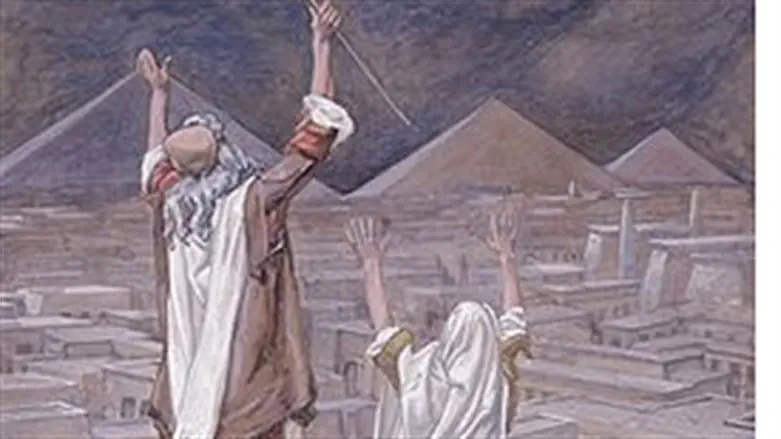
Our Sages expound:’The son of an Israelite woman went out’:He went out to erect his tent in the camp of the tribe of Dan; they rejected him, saying: You are the son of an Egyptian father, and the Torah says that encampment shall be ‘according to the house of your father’, not that of your mother. He immediately began to blaspheme and to ‘bless’ (clean language for ‘to curse’) Hashem.
They add:The woman’s husband was one of the Israeli ‘police’ that the Egyptians had placed over Bnei Israel, under Egyptian supervisors.
On that occasion, the Egyptian supervisor commanded the Israeli police-man, at night, to go out to look after his charges; as soon as he departed, the Egyptian, as had been his intent, entered the house of the Israeli police-man, and had relations with his wife.
The ‘son of the Israeli woman’ was born of that liason, and was therefore ‘the son of an Egyptian man’
The Ohr Hachaim Hakadosh comments:’The Torah chose the words ‘went out’, to denote that this occurred without the knowledge of the woman, as she thought that the man with whom she copulated was her husband.
Rav Yitzchak Karo asks:’. What did Hashem ‘do to’ this blasphemer, that led him to ‘bless’ Hashem? We don’t find any ‘wrong’ that Hashem may have done to him!
He answers:’Our Sages teach that he was the son of the Egyptian whom Moshe had ‘killed’, when he saw him striking one of the enslaved Children of Israel.
How did Moshe kill him? Say our Sages: by pronouncing the Special Name of Hashem.
Concludes the Rav: ‘The way of those embroiled in a dispute, is to seek to cast aspersions on their protagonist, and on his fore-bearers; here , his opponent said to him: You are the son of the Egyptian that Moshe killed by pronouncing the Special Name.
‘Upon hearing this, he ‘blessed’ that Special Name, to ‘avenge’ himself ‘against’ It’.
The Kli Yakar offers a different answer to the question posed by Rav Karo, saying:’All his days this son of the Egyptian whom Moshe had killed by pronouncing the Special Name, ‘blessed’ it within his heart; our Sages (Avot 4:5) teach that whoever profanes Hashem’s Name ‘in seclusion’, Hashem causes him to be punished in public’.
‘Hashem therefore caused that he should be embroiled in this dispute in public, so that his blasphemy should be uttered in the hearing of all the people, so that he should reap his ‘just desserts’’.
Rav Moshe Sternbuch brings a beautiful drasha of Rav Avraham Heschel of Cracow, to answer our question.
He first notes that, although the disputant was entitled to encamp in the camp of Bnei Israel, as his mother was an Israelite, the specific place within the camp is determined by the tribe of his father; he, nevertheless, demanded to encamp in the place of the tribe of his mother’s tribe, Dan. When he was prevented from doing so, he uttered his blasphemy.
‘Why did he decide to blaspheme? The answer may be gleaned from the drasha of Rav Heschel, as to the dialogue between Yaakov Avinu and his sons, on his deathbed.
Says the Yalkut Shimoni: ‘Yaakov asked his sons: Just as you come from several mothers, do you also have several gods? Answered his sons: Just as we all have but one father- you - so too, we have only G-d, our Heavenly Father’.
Expounds Rav Heschel: ‘Their answer showed that the ייחוס: the pedigree and ascription of sons who have different mothers, is solely according to the father, just as they all have one Heavenly Father.
‘This led the blasphemer to ‘bless’ Hashem, ‘the Father’, to show his disagreement, as, to achieve his purpose, he contended that the mother was the determinant- and that he was therefore entitled to encamp in the place of her tribe, which is why the Torah states that she was ‘of the tribe of Dan’’.
Rav Chaim Shmulevitz brings a different answer, based on the commentary of the Ba’alei Tosafot:’His being ‘the son of an Egyptian man’ was the root cause of his blasphemy, as the way of the Egyptians is to scorn the Name, as we find that Pharoah said:’I do not know this Hashem’.
‘And, though it seems a far stretch from the words of Pharoah, who was an idol-worshipper himself, to our ‘son of an Egyptian man’, we learn from the actions of our blasphemer, that asmall root of bad, even if concealed deep in the heart, can grow over time to be ‘a tree’, and to pass from father to son, for generations.
‘Until, as in our case, it grows to full blown blasphemy’.
A parting mussar lesson from the Alshich Hakadosh:’Even though Moshe was able to determine the punishment for the blasphemy by himself, he declined to do so, leaving it to Hashem ‘to clarify’.
‘He did so because, as he had killed the father of the blasphemer, there might have been ‘an opening’ to mockers to say that he did so because of his pre-existing prejudice against that ‘son of an Egyptian man’: that just as he killed his father, so too, he now wished to kill the son.
‘This’ says the Rav, ‘is why the Torah says that Moshe asked Hashem :’to clarify’, rather than asking to ‘see what’ Hashem would command.
Danny Ginsbourg is a retired lawyer who made aliya from Australia a decade ago. He has written five volumes of Torah thoughts in Hebrew,and was awarded the Jerusalem Prize.for the two volume Davsha shel Torah to which there are already several sequels.
לרפואת נועם עליזה בת זהבה רבקה ונחום אלימלך רפאל בן זהבה רבקה, בתוך שאר חולי עמנו.